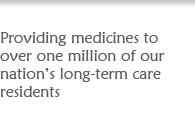May 31, 2006
Mark B. McClellan, MD, PhD
Administrator
Center for Medicare & Medicaid Services
Department of Health and Human Services
Room 309-G
Hubert H. Humphrey Building
200 Independence Avenue, S.W.
Washington, D.C. 20201
Dear Dr. McClellan:
Re: Comments on Medicare Marketing
Guidelines, Draft 2nd Rev. May 22, 2006
On behalf of the American Health Care Association (AHCA), I wish to express our appreciation for the opportunity to provide comments on the draft 2007 Part D Marketing Guidelines, especially as they relate to the provision of educational and marketing services to residents of long term care facilities. AHCA and its membership are committed to performance excellence and Quality First, a covenant for healthy, affordable, and ethical long term care. AHCA represents more than 10,000 non-profit and proprietary facilities dedicated to continuous improvement in the delivery of professional and compassionate care provided daily by millions of caring employees to more than 1.5 million of our nation’s frail, elderly and disabled citizens who live in nursing facilities, assisted living residences, subacute centers, and homes for persons with mental retardation and developmental disabilities.
We have spent a considerable amount of time working with officials at the Centers for Medicare and Medicaid Services (CMS) to understand how long term care facilities may assist residents in choosing Part D plans. We appreciate the language in the guidelines, unchanged from prior issuances, that certain types of activities may be undertaken by long term care facilities to ensure that residents are enrolled in plans that meet their needs. The marketing guidelines in the section on specific guidance about provide promotional activities indicates that facilities may provide an “objective assessment of the beneficiary’s needs.” Specifically, CMS states that:
Beneficiaries often look to their health care professionals to provide them with complete information regarding their health care choices (e.g., providing objective information regarding specific plans, such as covered benefits, cost sharing, drugs on formularies, utilization management tools). To the extent that a provider can assist a beneficiary in an objective assessment of the beneficiary’s needs and potential plan options that may meet those needs, providers are encouraged to do so. To this end, providers may certainly engage in discussions with beneficiaries when patients seek information or advice from their provider regarding their Medicare options. [1]
We believe this language is constructive and useful to providers seeking advice on permissible activity. However, both the spirit and the letter of this language is contradicted by CMS elsewhere. In particular, we are concerned that a recent letter from the Director of the Survey and Certification Group at CMS to state survey agency directors regarding nursing homes and Part D does not sufficiently recognize these guidelines; it does not follow the marketing guidelines quoted above or adequately clarify the role of the long term care provider in giving residents objective information about plan information.[2] The letter states that:
Under no circumstances should a nursing home require, request, coach, or steer any resident to select or change a plan for any reason. Furthermore, a nursing home should not knowingly and/or willingly allow the pharmacy servicing the nursing home to require, request, coach, or steer any resident to select or change a plan [42 C.F.R. §483.12(d)]. Nursing homes may, and are encouraged to, provide information and education to residents on all available Part D plans." [3]
This paragraph stresses prohibited activity without adequate attention to activity that is not prohibited, and that CMS itself has hoped that nursing facilities would provide, such as assisting the resident and or family in choosing a plan that encompasses the drugs that the resident needs. Also, the negative approach in this paragraph is contrary to CMS' intent that facilities educate, inform, and assist their residents when necessary to choose the best plan possible expressed in the marketing guidelines.
We fear that this negative approach will direct surveyors to ignore the appropriate facility actions. The negativity is reinforced by including redundant statements, e.g., “under no circumstances” and “for any reason” in place of clear statements that tell surveyors what facilities are allowed to do to educate and residents and help facilitate their Part D selection within the context of the rules.
We ask you to direct the Office of Survey and Certification to clarify that long term care facilities may provide objective information to its residents and that we are permitted to make available and/or distribute plan marketing materials for all plans. We recognize that providers cannot “direct, urge or attempt to persuade beneficiaries to enroll in a specific plan…or cannot offer anything of value to induce plan enrollees to select” a plan. However, S&C-06-16 makes strong assertions about the type of activities that may not be conducted without providing a balanced assessment as to whether the activities have a financial incentive, are objectively evaluated, and are ensuring that residents have sufficient information to make appropriate decisions about plan options. This letter has a chilling effect on long term care facilities’ efforts to assist residents in obtaining objective information -- the result that is not intended by these draft guidelines.
Again, we appreciate the opportunity to comment on these draft guidelines and ask you to ensure all relevant information regarding these efforts are consistent within CMS. It is our belief that long term care facility beneficiaries need access to objective information in order to make informed decisions. We appreciate your clarity on this issue in the marketing guidelines and the help it provides to us in our continuing to ensure that residents of long term care facilities get access to medically necessary prescription drugs under Part D.
Sincerely yours,
Bruce Yarwood
President and CEO


